Thomas James Richards, Diaries, Transcript Vol. 3, 26 January to 8 November 1916 - Part 31
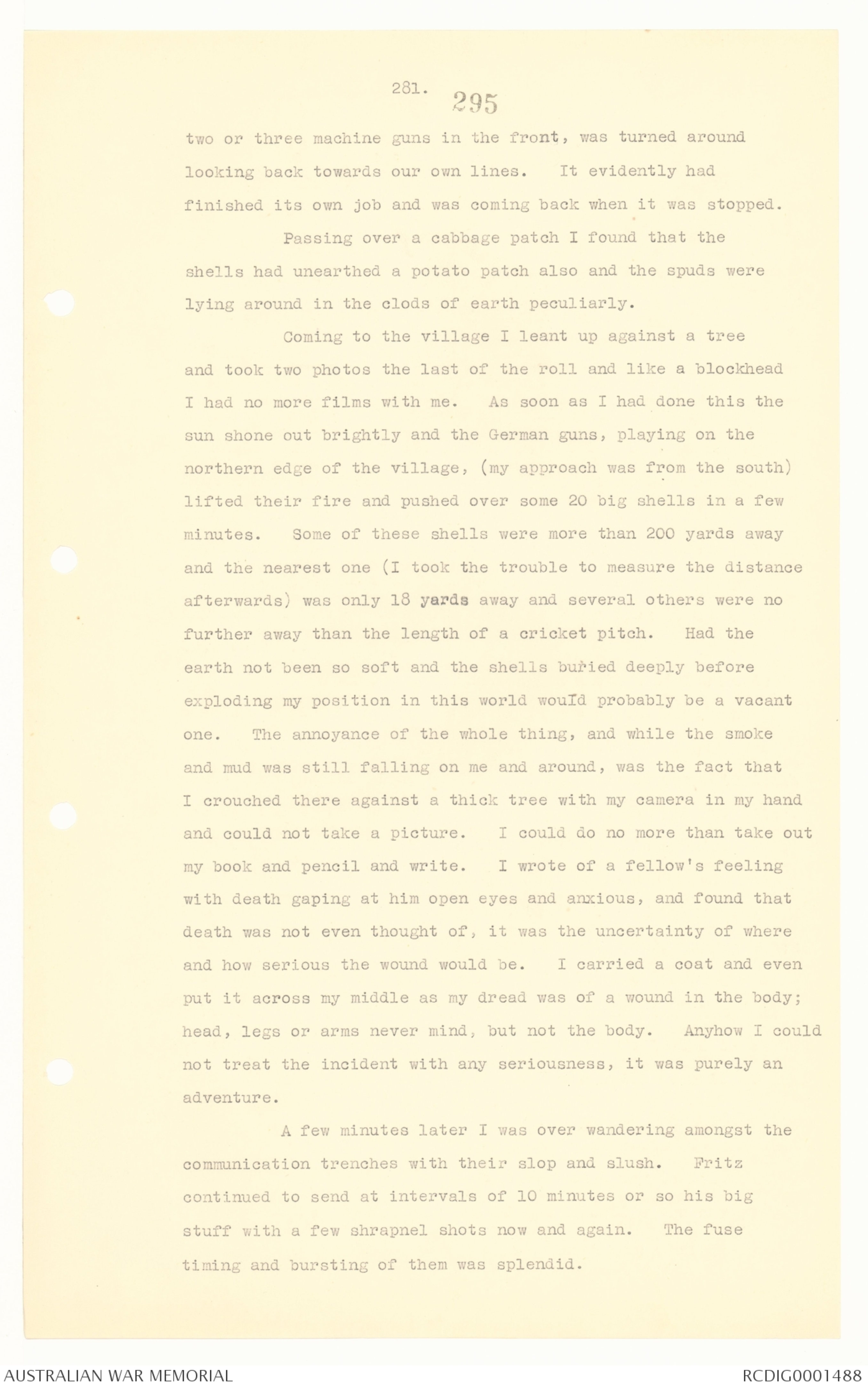
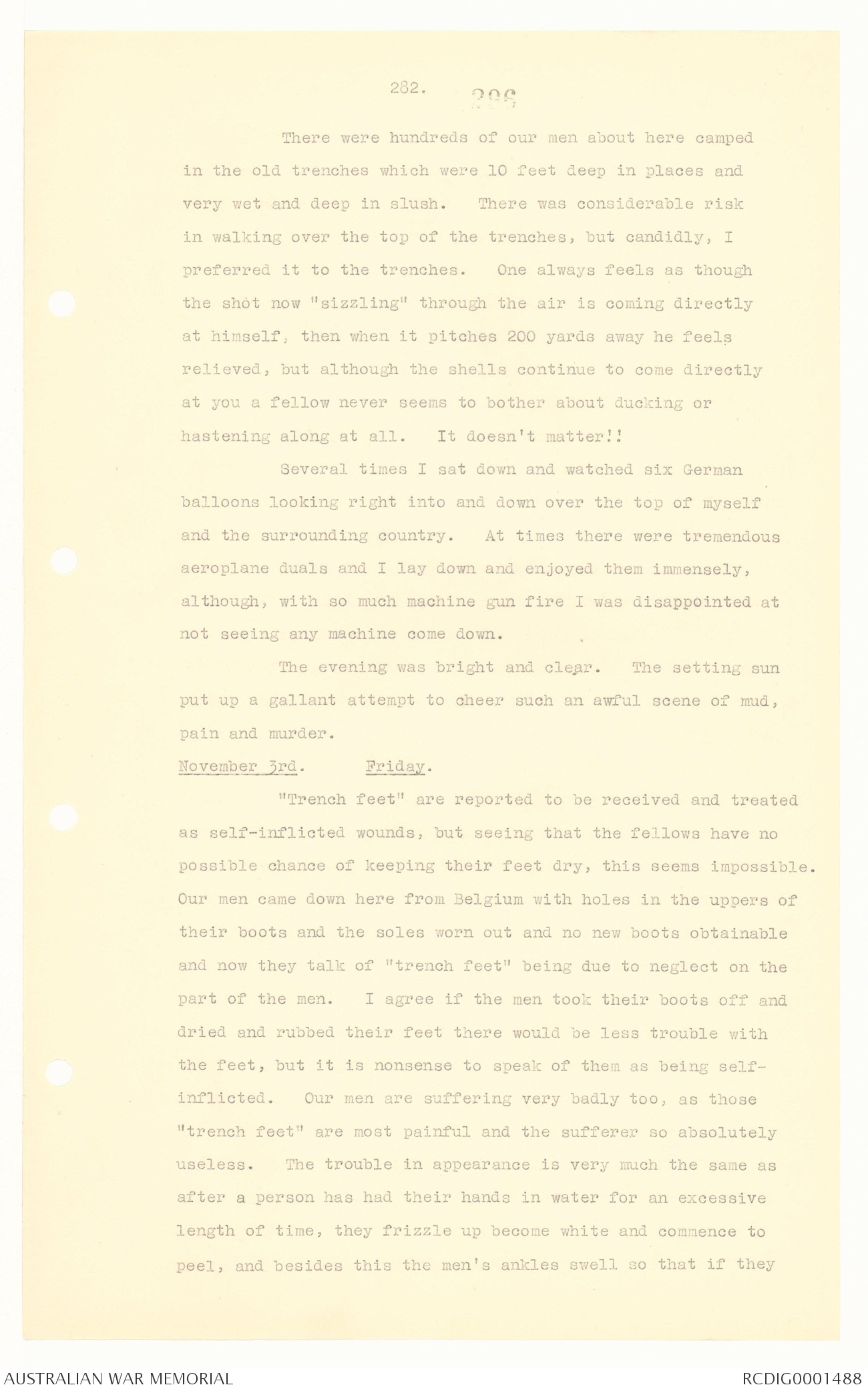
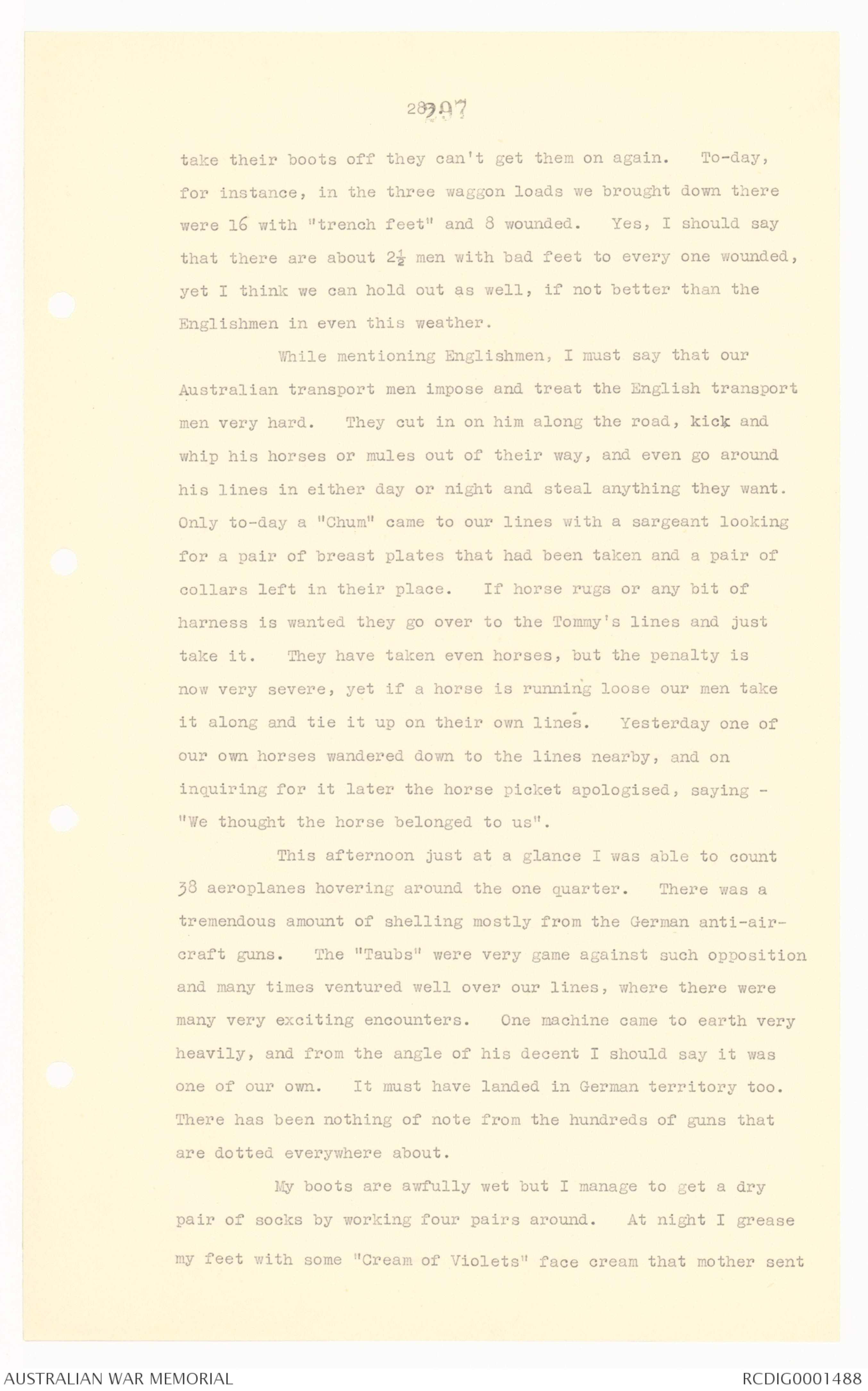
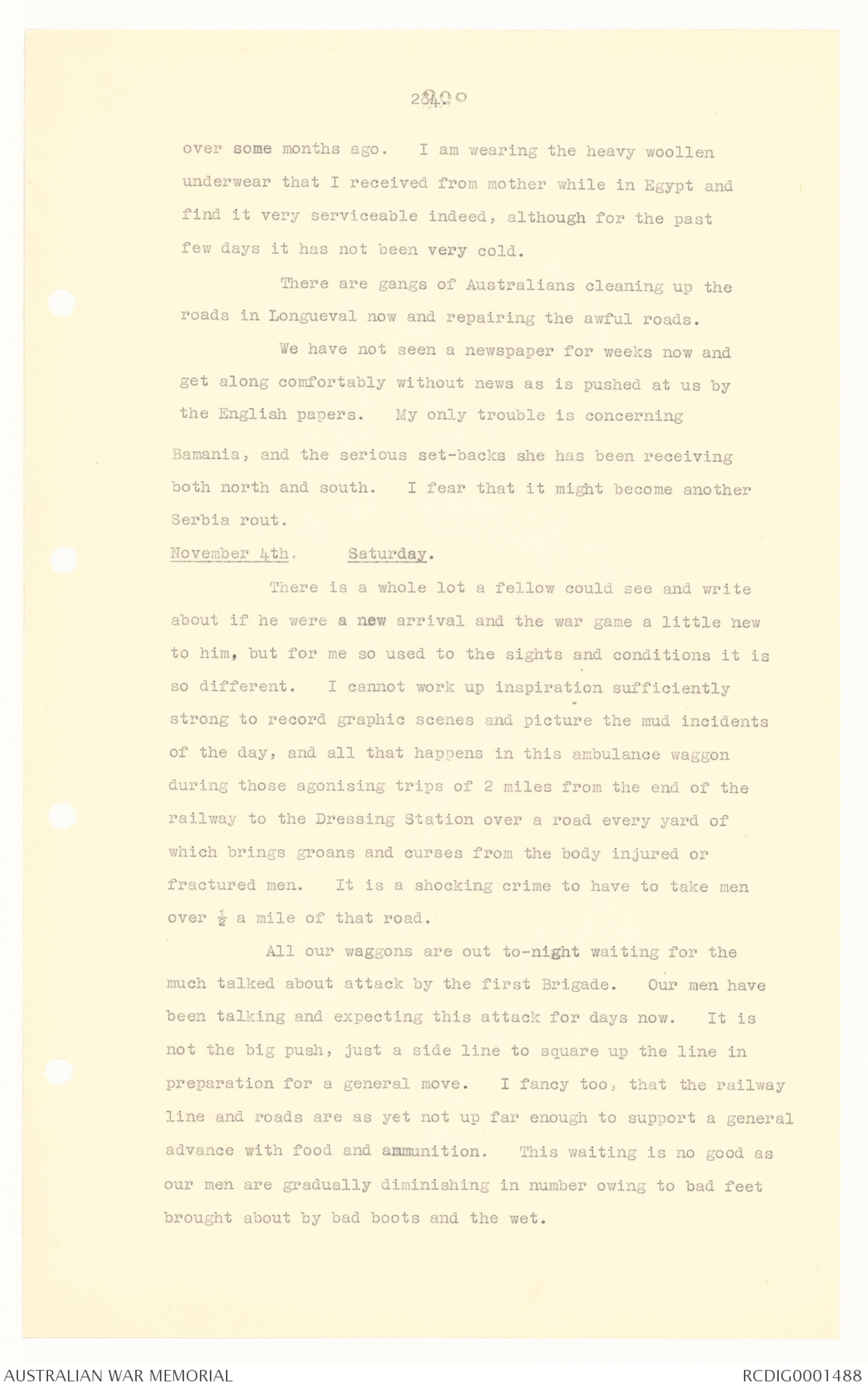
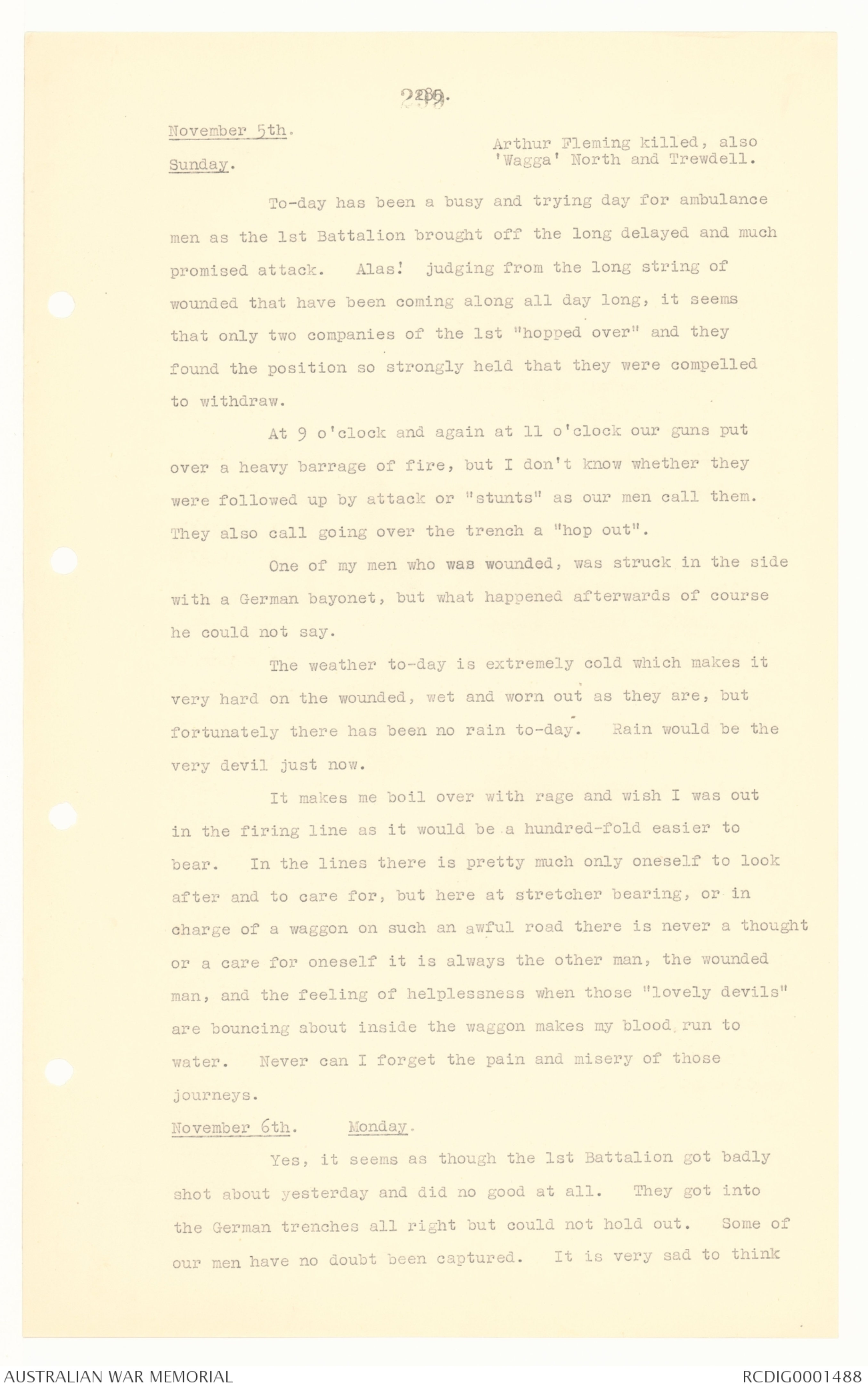
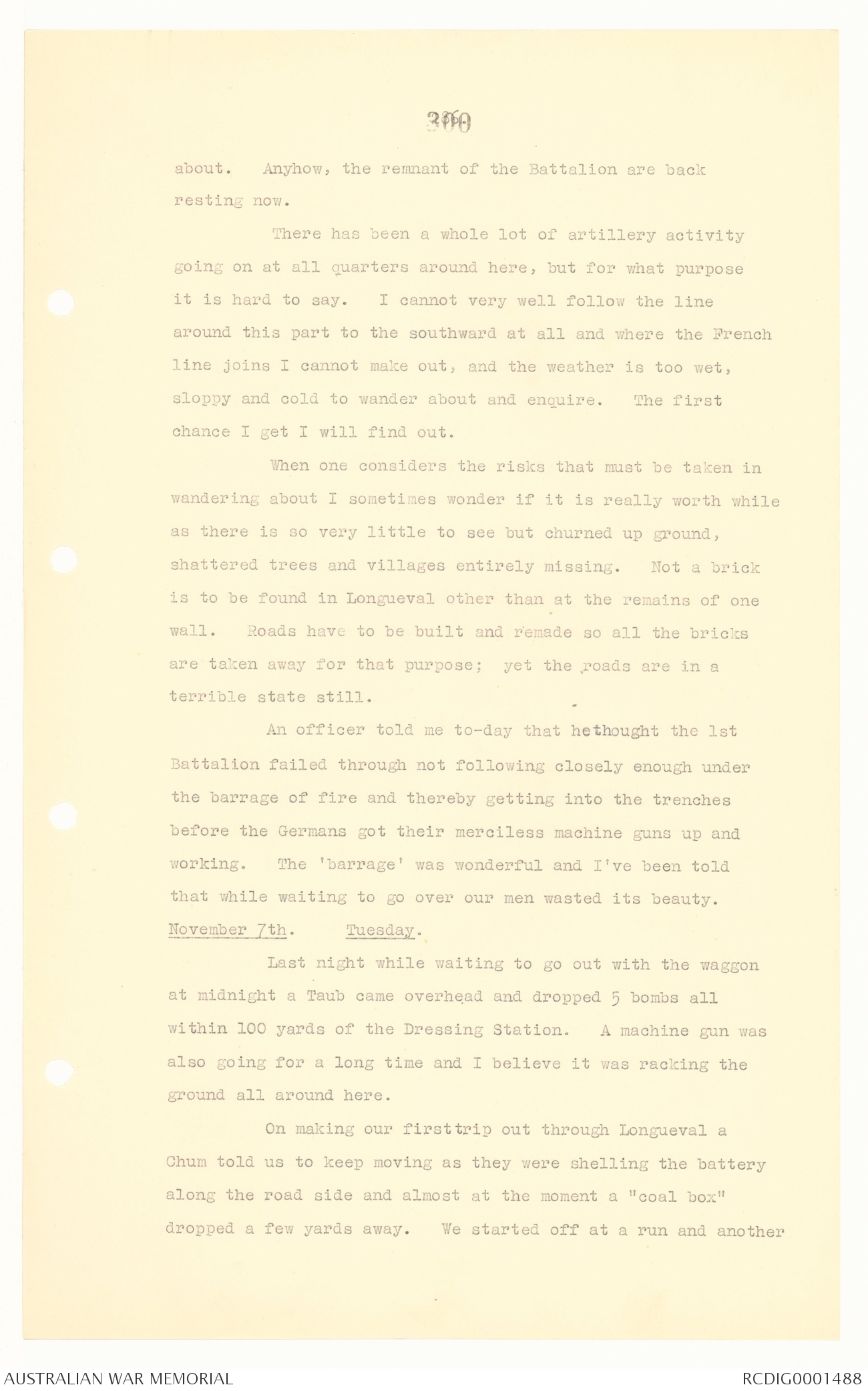
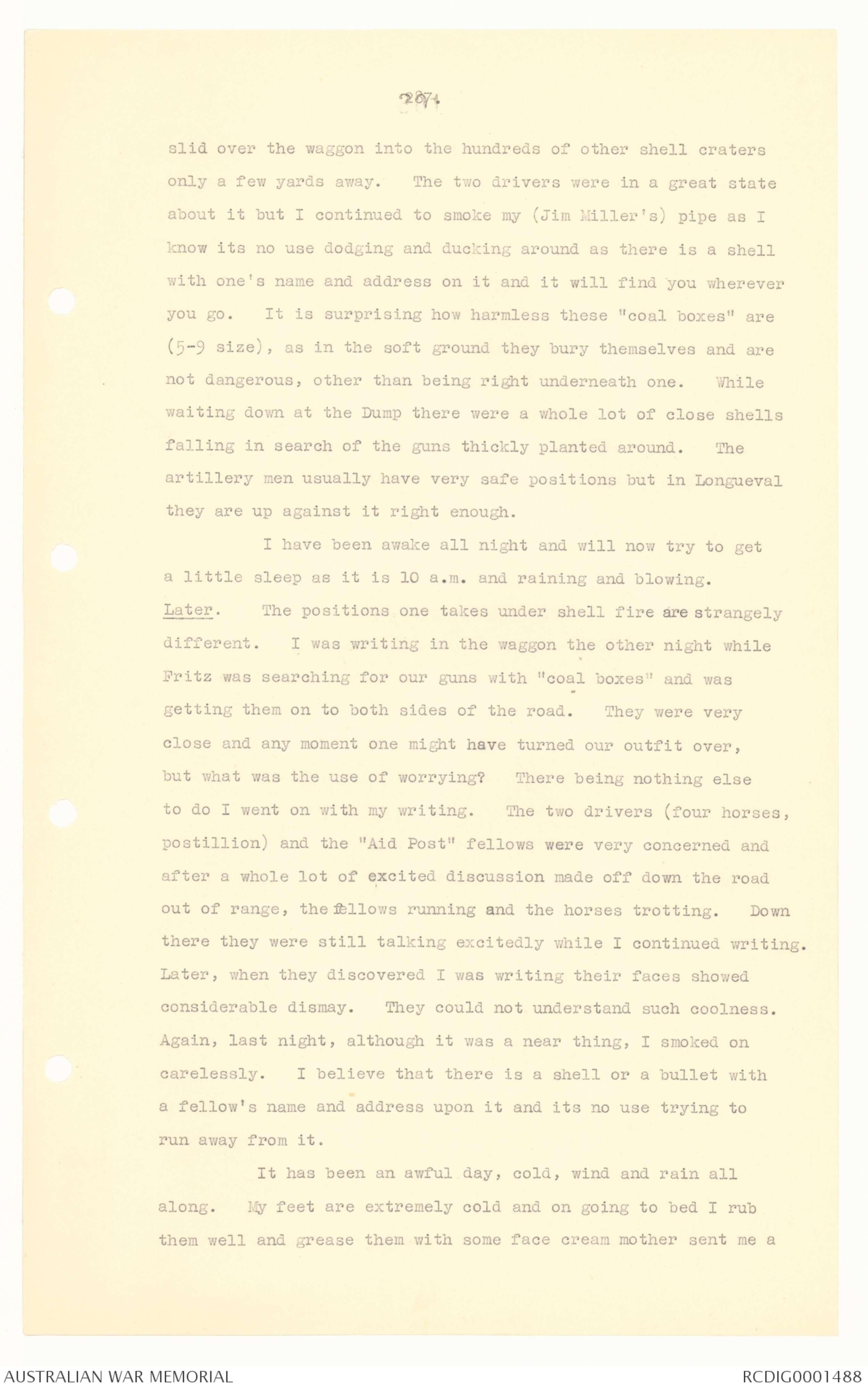
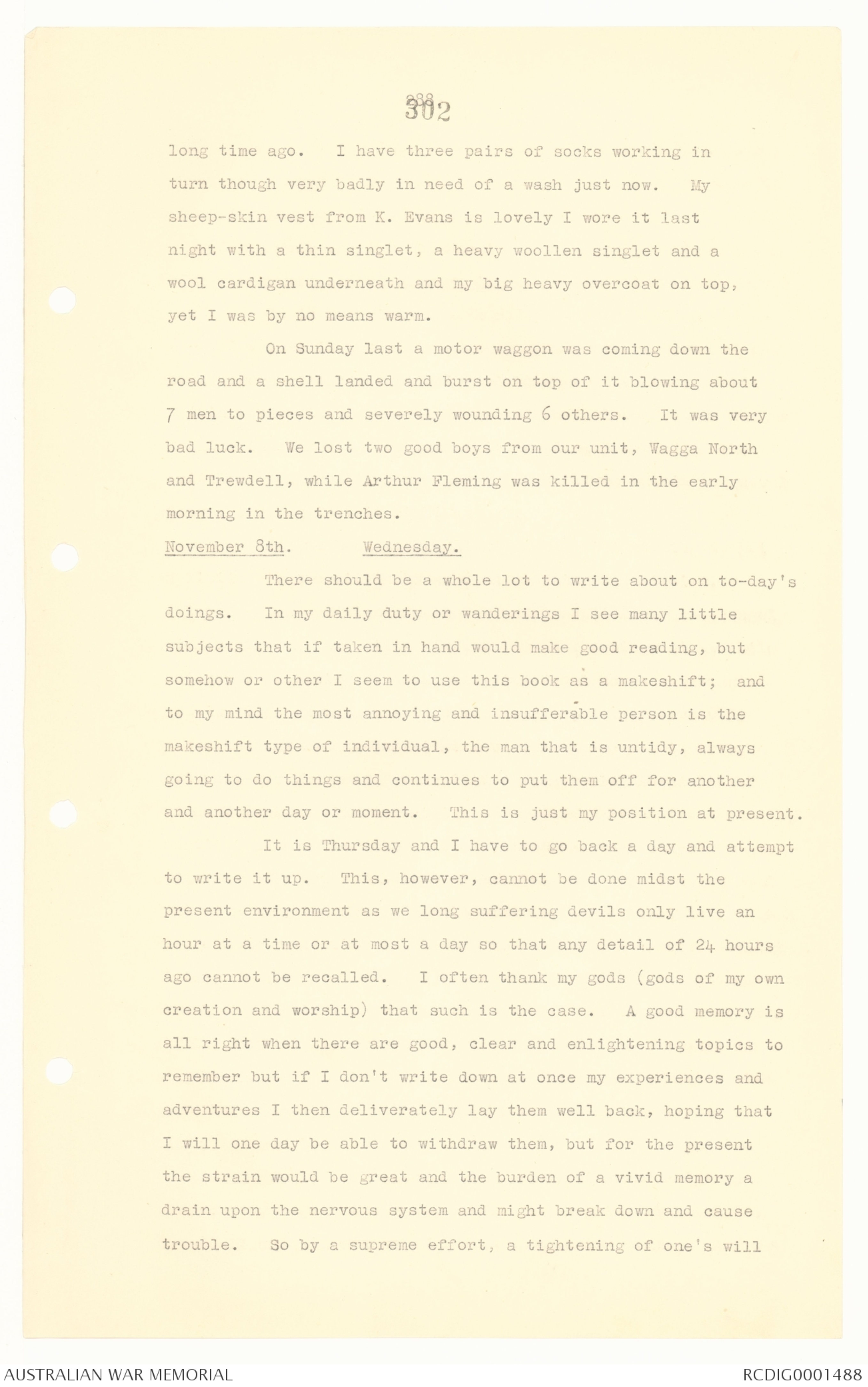
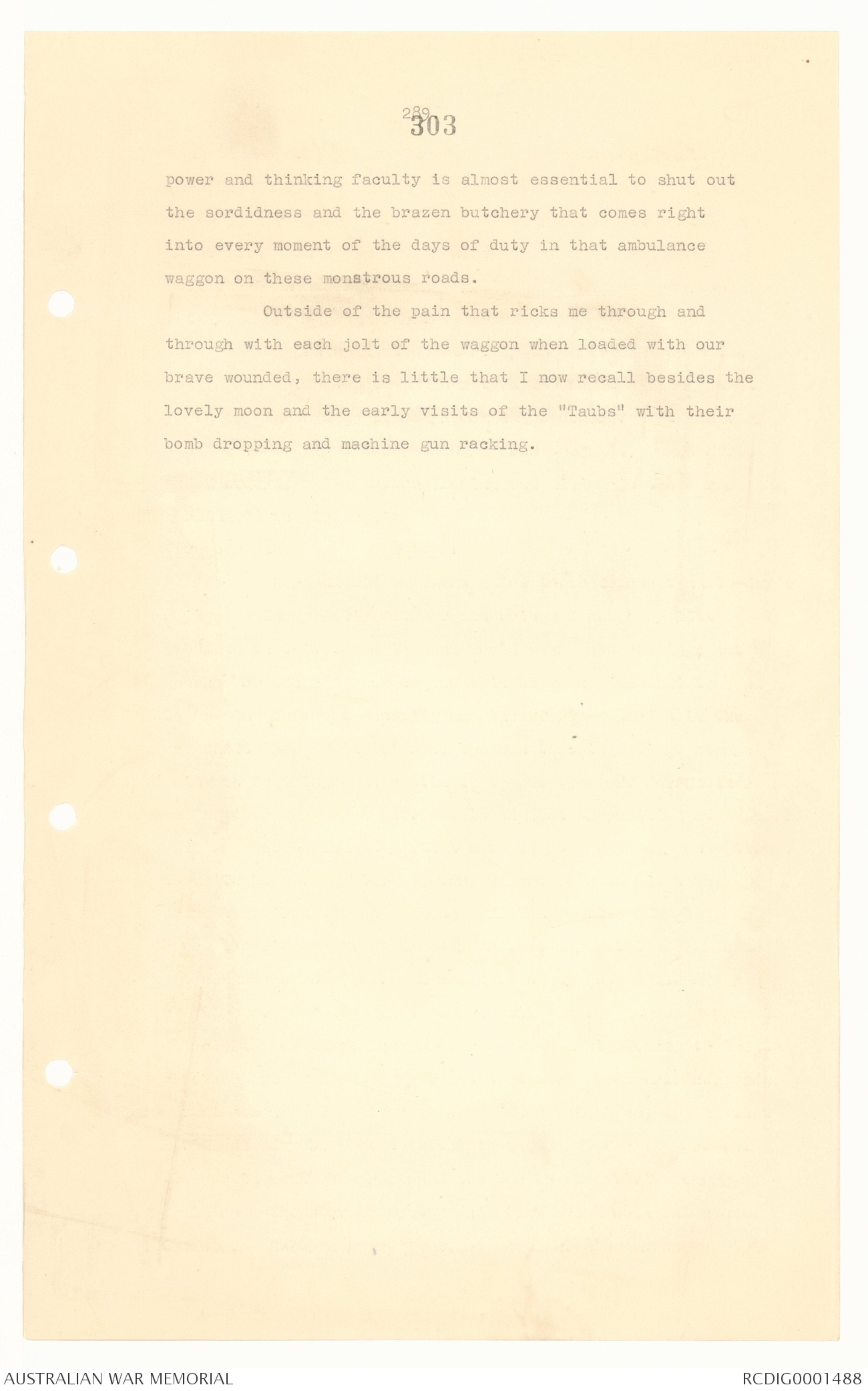
281.
295
two or three machine guns in the front, was turned around
looking back towards our own lines. It evidently had
finished its own job and was coming back when it was stopped.
Passing over a cabbage patch I found that the
shells had unearthed a potato patch also and the spuds were
lying around in the clods of earth peculiarly.
Coming to the village I leant up against a tree
and took two photos the last of the roll and like a blockhead
I had no more films with me. As soon as I had done this the
sun shone out brightly and the German guns, playing on the
northern edge of the village, (my approach was from the south)
lifted their fire and pushed over some 20 big shells in a few
minutes. Some of these shells were more than 200 yards away
and the nearest one (I took the trouble to measure the distance
afterwards) was only 18 yards away and several others were no
further away than the length of a cricket pitch. Had the
earth not been so soft and the shells buried deeply before
exploding my position in this world would probably be a vacant
one. The annoyance of the whole thing, and while the smoke
and the mud was still falling on me and around, was the fact that
I crouched there against a thick tree with my camera in my hand
and could not take a picture. I could do no more than take out
my book and pencil and write. I wrote of a fellow's feeling
with death gaping at him open eyes and anxious, and found that
death was not even thought of, it was the uncertainty of where
and how serious the wound would be. I carried a coat and even
put it across my middle as my dread was of a wound in the body;
head, legs or arms never mind, but not the body. Anyhow I could
not treat the incident with any seriousness, it was purely an
adventure.
A few minutes later I was over wandering amongst the
communication trenches with their slop and slush. Fritz
continued to send at intervals of 10 minutes or so his big
stuff with a few shrapnel shots now and again. The fuse
timing and bursting of them was splendid.
282.
296
There were hundreds of our men about here camped
in the old trenches which were 10 feet deep in places and
very wet and deep in slush. There was considerable risk
in walking over the top of the trenches, but candidly, I
preferred it to the trenches. One always feels as though
the shot now "sizzling" through the air is coming directly
at himself, then when it pitches 200 yards away he feels
relieved, but although the shells continue to come directly
at you a fellow never seems to bother about ducking or
hastening along at all. It doesn't matter!!
Several times I sat down and watched six German
balloons looking right into and down over the top of myself
and the surrounding country. At times there were tremendous
aeroplane duals and I lay down and enjoyed them immensely,
although, with so much machine gun fire I was disappointed at
not seeing any machine come down.
The evening was bright and clear. The setting sun
put up a gallant attempt to cheer such an awful scene of mud,
pain and murder.
November 3rd. Friday.
"Trench feet" are reported to be received and treated
as self-inflicted wounds, but seeing that the fellows have no
possible chance of keeping their feet dry, this seems impossible.
Our men came down here from Belgium with holes in the uppers of
their boots and the soles worn out and no new boots obtainable
and now they talk of "trench feet" being due to neglect on the
part of the men. I agree if the men took their boots off and
dried and rubbed their feet there would be less trouble with
the feet, but it is nonsense to speak of them as being self-inflicted.
Our men are suffering very badly too, as those
"trench feet" are most painful and the sufferer so absolutely
useless. The trouble in appearance is very much the same as
after a person has had their hands in water for an excessive
length of time, they frizzle up become white and commence to
peel, and besides this the men's ankles swell so that if they take
283. 297
take their boots off they can't get them on again. To-day,
for instance, in the three waggon loads we brought down there
were 16 with "trench feet" and 8 wounded. Yes, I should say
that there are about 2½ men with bad feet to every one wounded,
yet I think we can hold out as well, if not better than the
Englishmen in even this weather.
While mentioning Englishmen, I must say that our
Australian transport men impose and treat the English transport
men very hard. They cut in on him along the road, kick and
whip his horses or mules out of their way, and even go around
his lines in either day or night and steal anything they want.
Only to-day a "Chum" came to our lines with a sargeant looking
for a pair of breast plates that had been taken and a pair of
collars left in their place. If horse rugs or any bit of
harness is wanted they go over to the Tommy's lines and just
take it. They have taken even horses, but the penalty is
now very severe, yet if a horse is running loose our men take
it along and tie it up on their own lines. Yesterday one of
our own horses wandered down to the lines nearby, and on
inquiring for it later the horse picket apologised, saying -
"We thought the horses belonged to us".
This afternoon just at a glance I was able to count
38 aeroplanes hovering around the one quarter. There was a
tremendous amount of shelling mostly from the German anti-aircraft
guns. The "Taubs" were very game against such opposition
and many times ventured well over our lines, where there were
many very exciting encounters. One machine came to earth very
heavily, and from the angle of his descent I should say it was
one of our own. It must have landed in German territory too.
There has been nothing of note from the hundreds of guns that
are dotted everywhere about.
My boots are awfully wet but I manage to get a dry
pair of socks by working four pairs around. At night I grease
my feet with some "Cream of Violets" face cream that mother sent
284. 298
over some months ago. I am wearing the heavy woollen
underwear that I received from mother while in Egypt and
find it very serviceable indeed, although for the past
few days it has not been very cold.
There are gangs of Australians cleaning up
the roads in Longueval now and repairing the awful roads.
We have not seen a newspaper for weeks now and
get along comfortably without news as is pushed at us by
the English papers. My only trouble is concerning
Bamania, and the serious set-backs she has been receiving
both north and south. I fear that it might become another
Serbia rout.
November 4th. Saturday.
There is a whole lot a fellow could see and write
about if he were a new arrival and the war game a little new
to him, but for me so used to the sights and conditions it is
no different. I cannot work up inspiration sufficiently
strong to record graphic scenes and picture the mud incidents
of the day, and all that happens in this ambulance waggon
during those agonising trips of 2 miles from the end of the
railway to the Dressing Station over a road every yard of
which brings groans and curses from the body injured or
fractured men. It is a shocking crime to have to take men
over ½ a mile of that road.
All our waggons are out to-night waiting for the
much talked about attack by the first Brigade. Our men have
been talking and expecting this attack for days now. It is
not the big push, just a side line to square up the line in
preparation for a general move. I fancy too, that the railway
line and roads are as yet not up far enough to support a general
advance with food and ammunition. This waiting is no good as
our men are gradually diminishing in number owing to bad feet
brought about by bad boots and the wet.
285. 299
November 5th.
Sunday.
Arthur Fleming killed , also
'Wagga' North and Trewdell.
To-day has been a busy and trying day for ambulance
men as the 1st Battalion brought off the long delayed and much
promised attack. Alas! judging from the long string of
wounded that have been coming along all day long, it seems
that only two companies of the 1st "hopped over" and they
found the position so strongly held that they were compelled
to withdraw.
At 9 o'clock and again at 11 o'clock our guns put
over a heavy barrage of fire, but I don't know whether they
were followed up by attack or "stunts" as our men call them.
They also call going over the trench a "hop out".
One of my men who was wounded, was struck in the side
with a German bayonet, but what happened afterwards of course
he could not say.
The weather to-day which is extremely cold which makes it
very hard on the wounded, wet and worn out as they are, but
fortunately there has been no rain to-day. Rain would be the
very devil just now.
It makes me boil over with rage and wish I was out
in the firing line as it would be a hundred-fold easier to
bear. In the lines there is pretty much only oneself to look
after and to care for, but here at stretcher bearing, or in
charge of a waggon on such an awful road there is never a thought
or care for oneself it is always the other man, the wounded
man, and the feeling of helplessness when those "lovely devils"
are bouncing about inside the waggon makes my blood run to
water. Never can I forget the pain and misery of those
journeys.
November 6th. Monday.
Yes, it seems as though the 1st Battalion got badly
shot about yesterday and did no good at all. They got into
the German trenches all right but could not hold out. Some of
our men have no doubt been captured. It is very sad to think
286. 300
about. Anyhow, the remnant of the Battalion are back
resting now.
There has been a whole lot of artillery activity
going on at all quarters around here, but for what purpose
it is hard to say. I cannot very well follow the line
around this part to the southward at all and where the French
line joins I cannot make out, and the weather is too wet,
sloppy and cold to wander about and enquire. The first
chance I get I will find out.
When one considers the risks that must taken in
wandering about I sometimes wonder if it is really worth while
as there is so very little to see but churned up ground,
shattered trees and villages entirely missing. Not a brick
is to be found in Longueval other than at the remains of one
wall. Roads have to be built and remade so all the bricks
are taken away for that purpose; yet the roads are in a
terrible state still.
An officer told me to-day that he thought the 1st
Battalion failed through not following closely enough under
the barrage of fire and thereby getting into the trenches
before the Germans got their merciless machine guns up and
working. The "barrage" was wonderful and I've been told
that while waiting to go over our men our men wasted its beauty.
November 7th. Tuesday.
Last night while waiting to go out with the waggon
at midnight a Taub came overhead and dropped 5 bombs all
within 100 yards of the Dressing Station. A machine gun was
also going for a long time and I believe it was racking the
ground all around here.
On making our first trip out through Longueval a
Chum told us to keep moving as they were shelling the battery
along the road side and almost at the moment a "coal box"
dropped a few yards away. We started off at a run and another
287. 301
slid over the waggon into the hundreds of other shell craters
only a few yards away. The two drivers were in a great state
about it but I continued to smoke my (Jim Miller's) pipe as I
know its no use dodging and ducking around as there is a shell
with one's name and address on it and it will find you wherever
you go. It is surprising how harmless these "coal boxes" are
(5-9 size), as in the soft ground they bury themselves and are
not dangerous , other than being right underneath one. While
waiting down at the Dump there were a whole lot of close shells
falling in search of the guns thickly planted around. The
artillery men usually have very safe positions but in Longueval
they are up against it right enough.
I have been awake all night and will now try to get
a little sleep as it is 10 a.m. and raining and blowing.
Later.The positions one takes under shell fire are strangely
different. I was writing in the waggon the other night while
Fritz was searching for our guns with "coal boxes" and was
getting them on to both sides of the road. They were very
close and any moment one might have turned our outfit over,
but what was the use of worrying? There being nothing else
to do I went on with my writing. The two drivers (four horses,
postillion) and the "Aid Post" fellows were very concerned and
after a whole lot of excited discussion made off down the road
out of range, the fellows running and the horses trotting. Down
there they were still talking excitedly while I continued writing.
Later, when they discovered I was writing their faces showed
considerable dismay. They could not understand such coolness.
Again, last night, although it was a near thing, I smoked on
carelessly. I believe that there is a shell or bullet with
a fellow's name and address upon it and its no use trying to
run away from it.
It has been an awful day, cold, wind and rain all
along. My feet are extremely cold and on going to bed I rub
them well and grease them with some face cream mother sent me a
288.
302
long time ago. I have three pairs of socks working in
turn though very badly in need of a wash just now. My
sheep-skin vest from K. Evans is lovely I wore it last
night with a thin singlet, a heavy woollen singlet and a
wool cardigan underneath and my big heavy overcoat on top,
yet I was by no means warm.
On Sunday last a motor waggon was coming down the
road and a shell landed and burst on top of it blowing about
7 men to pieces and severely wounding 6 others. It was very
bad luck. We lost two good boys from our unit, Wagga North
and Trewdell, while Arthur Fleming was killed in the early
morning in the trenches.
November 8th. Wednesday.
There should be a whole lot to write about on to-day's
doings. In my daily duty or wanderings I see many little
subjects that if taken in hand would make good reading, but
somehow or other I seem to use this book as a makeshift; and
to my mind the most annoying and insufferable person is the
makeshift type of individual, the man that is untidy, always
going to do things and continues to put them off for another
and another day or moment. This is just my position at present.
It is Thursday and I have to go back a day and attempt
to write it up. This, however, cannot be done midst the
present environment as we long suffering devils only live an
hour at a time or at most a day so that any detail of 24 hours
ago cannot be recalled. I often thank my gods (gods of my own
creation and worship) that such is the case. A good memory is
all right when there are good, clear and enlightening topics to
remember but if I don't write down at once my experiences and
adventures I then deliverately lay them well back, hoping that
I will one day be able to withdraw them, but for the present
the strain would be great and the burden of a vivid memory a
drain upon the nervous system and might break down and cause
trouble. So by a supreme effort, a tightening of one's will
289
303
power and thinking faculty is almost essential to shut out
the sordidness and the brazen butchery that comes right
into every moment of the days of duty in that ambulance
waggon on these monstrous roads.
Outside of the pain that ricks me through and
through with each jolt of the waggon when loaded with our
brave wounded, there is little that I now recall besides the
lovely moon and the early visits of the "Taubs" with their
bomb dropping and machine gun racking.
 Sam scott
Sam scottThis transcription item is now locked to you for editing. To release the lock either Save your changes or Cancel.
This lock will be automatically released after 60 minutes of inactivity.